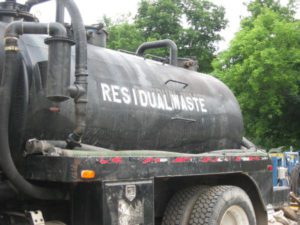
Pennsylvania’s biggest step forward to fight the climate crisis showed up for its court hearing on Tuesday, May 10–and Clean Air Council attorneys were there to defend it
Harrisburg, PA (May 20, 2022) On April 23, 2022, the Pennsylvania Department of Environmental Protection (DEP) published a long-awaited rule that will put a price on carbon pollution and enable the Commonwealth to participate in the Regional Greenhouse Gas Initiative. RGGI, as it’s known (pronounced “Reggie”), is a cap-and-invest program for power plant pollution that all Northeastern states from Virginia on up through Maine participate in. Before April 23rd, Pennsylvania had been a glaring hole in the middle of the regional marketplace. The program works by requiring fossil-fuel-fired power plants (with 25 megawatts or greater capacity) to obtain allowances for every ton of carbon dioxide they spew into the atmosphere. These allowances are sold at quarterly auctions and can be traded on a secondary marketplace. Over time, the supply of allowances decreases, driving down power plant pollution that is harmful to human health, and lowering the amounts of greenhouse gasses that are pumped into the air. Every ton of CO2 avoided will reduce the odds of truly catastrophic climate change impacts, and people will breathe cleaner air as a result. And what’s more, the money from the auctions will be deposited in a special, segregated account known as the Clean Air Fund, which DEP must administer in the use of further eliminating air pollution.
RGGI is a win-win-win for the public. But, unsurprisingly, the coal industry and a group of politicians in Harrisburg have gone to court to block Pennsylvania from moving forward with RGGI. All of the challengers have asked the Commonwealth Court to issue an order enjoining (or stopping) the RGGI rule from taking effect while their challenges are pending before the court. Every day that Pennsylvania families and communities are subject to virtually unrestricted power plant pollution, the climate gets more hazardous and the quality of the air we breathe suffers. The court scheduled a two-day hearing for May 10-11 in Harrisburg to hear evidence on whether to put a hold on the RGGI rule.
Shortly before the hearing, Clean Air Council asked the court to be allowed to intervene as a party. The court allowed the Council and its allied organizations–PennFuture, Sierra Club, Environmental Defense Fund, and Natural Resources Defense Council–to participate in the hearing but held off on deciding whether we would be full participants during the rest of the case. Over the course of two days, we put on witnesses who gave powerful testimony about the adverse effects of air pollution from power plants on human health and the public interest. The politicians offered the testimony of Senator Gene Yaw – a loud and vocal opponent of RGGI – and the coal industry offered up a power plant executive who argued that RGGI would cut into his plants’ profits.
At the end of the hearing, the judge set a schedule for the parties to submit written briefs for their sides. While we don’t yet know how the court will rule, much is at stake. The new Pennsylvania RGGI rule is the most important effort the state has undertaken to lower greenhouse gas emissions. It is not enough, but it is a critical first step. Clean Air Council will not stand aside as the coal industry and out-of-touch politicians hold our lungs and our lives hostage.
For more information contact Alex Bomstein, Director of Litigation, abomstein@cleanair.org.

Do you feel like politics has gotten more contentious over time? Do you feel like your interests are not represented in government? You’re not alone, and you’re not imagining it. Corporations wield their political power at the expense of regular people, and politicians rarely listen to their constituents, let alone each other.
Harrisburg is no better than Washington. Pennsylvanians want to protect our environment by wide margins. Polls show that most Pennsylvanians oppose fracking. Most Pennsylvanians want the state to do more to combat climate change. Almost nine out of ten Pennsylvania voters say that open space is important to them. Yet the Pennsylvania General Assembly has not passed any major pro-environment legislation in many years. That’s because our politicians by and large don’t represent the interests of the people.
One big reason that our system is so undemocratic is that our elections are designed to disempower the public. And it’s the public that protects our air, our land, and our water—corporate interests won’t do it for us.
Gerrymandering refers to the practice of drawing the lines of voting districts to benefit some interests at the expense of others. Because the State House and State Senate district lines in Pennsylvania are gerrymandered, competitive races among politicians with different values are rare, so voters often sit them out. And because the districts often stretch out over long, twisting expanses of geography, it can be hard for voters within a district to band together to protect their interests.
In 2018, the Pennsylvania Supreme Court undid the gerrymandered Pennsylvania Congressional district lines, declaring, “[a]n election corrupted by extensive, sophisticated gerrymandering and partisan dilution of votes is not ‘free and equal.’” Unfortunately, the gerrymandered House and Senate district lines remain, and partisan interests will again seek to redraw the Congressional district lines.
We don’t have to stand for unfair districts in Pennsylvania. Every decade, the U.S. Census compiles new demographic data that the states use to draw new voting districts. Right now, Pennsylvania is working on gathering information to draw those districts, and it’s asking for the public to weigh in on the process. There are hearings going on now at which you can testify about your desire for fair and impartial districts. You can find out more about how to do that here: https://www.fairdistrictspa.com/updates/happening-now-testimony-opportunities-for-fair-maps. You can also call or write to your State Representative and State Senator. If you’re not sure who they are or how to reach them, you can find out here: https://www.legis.state.pa.us/cfdocs/legis/home/findyourlegislator/. Don’t wait—get involved now!
It may seem counterintuitive to lament that politicians don’t listen to us and then suggest that you talk to your politicians. But while our voices should have more power, that doesn’t mean that they have none now. Clean Air Council members time and again win hard-earned victories against corporate interests by organizing, speaking up, and fighting hard. Our model is built on the power of the people. We can win fair districts in Pennsylvania. When we do, our voices demanding clean air, pure water, and a healthy environment will have to be heard.
By Alex Bomstein, Senior Litigation Attorney, abomstein@cleanair.org
HARRISBURG, PA (June 30, 2021) We celebrated a big victory in mid-June with a court ruling that restored the rights of people across Pennsylvania to challenge fracked gas projects that threaten their health and their environment! Residents of Upper Bucks County and a local municipality, West Rockhill Township, had appealed a decision of the Pennsylvania Department of Environmental Protection granting an air pollution permit to the Adelphia Gateway Pipeline project for its Quakertown Compressor Station. The Adelphia Gateway Pipeline is a gas pipeline cutting through the Lehigh Valley and the Philadelphia suburbs. Compressor stations are large, polluting facilities that push the gas along the pipeline to its destination.
The Pennsylvania Environmental Hearing Board (EHB) had thrown out the appeals, saying that it didn’t have a right to hear them, and that only federal appeals courts could hear challenges to projects that are part of interstate gas pipelines. But the EHB is designed to make it simple for everyday people to file appeals. At the EHB, parties can bring new evidence to the judges and have a trial on the new evidence. Challenges to these projects in federal court can be more complicated and don’t allow the parties to put on new evidence and have a trial. The EHB decisions had kept the township and the residents from getting their day in court and threatened to keep other people from being able to exercise their rights to appeal harmful projects, too.
With Clean Air Council’s help, the parties appealed the EHB’s decisions to the Pennsylvania Commonwealth Court. The Commonwealth Court reversed the decisions, agreeing that federal law dealing with interstate gas pipelines did not conflict with state law giving people the right to take their appeals to the EHB. The residents and the township can now move ahead with their cases at the EHB challenging the dangerous Quakertown Compressor Station, and all Pennsylvanians’ rights have been protected!
For more information contact Alex Bomstein, Senior Litigation Attorney, abomstein@cleanair.org

Photo: Iris Marie Bloom
Clean Air Council and its allies achieved a major victory in March in their efforts to ensure that the voices of Pennsylvanians are heard when it comes to fracking and the toxic waste it produces!
While many people know that the fracking industry pollutes the air and water, a lesser-known aspect of the process is how the industry handles and recirculates the toxic liquids fracking generates. When drilling a gas well, several different types of waste liquids need to be disposed of. First, there is “produced water,” which refers to a type of brine that comes up and out of the gas well from underground. Although it is naturally occurring, it is noxious and harmful if mixed with surface or groundwater. Next is “flowback,” which is the liquid that comes back up after being injected into the fracked well. This includes a chemical cocktail of fracking fluids and whatever happens to be picked up deep underground. Drilling fluid waste and other oil and gas liquids wastes also need to be dealt with.
The Pennsylvania Department of Environmental Protection allows gas companies to collect this waste in tanks and pits and then process and reuse it. Though DEP calls this “beneficial use,” the liquid wastes are used to frack more wells — and there is nothing beneficial about that. These dirty operations often spill their toxic waste and rack up violations.
DEP first created a general permitting process for these waste facilities a decade ago. Each permit issued then lasted ten years. As these permits were ready to expire at the close of 2020, the Department revised the general permit. Under the revised plan, the public would have notice of any proposals for waste facilities to be covered under the new permits and an opportunity to provide comments and feedback on those proposals.
However, once DEP finalized the general permit, it went right ahead and issued the approvals for almost all of the fracking waste facilities in Pennsylvania without giving the public a heads-up or opportunity to comment. All of a sudden, 49 facilities had the go-ahead to continue or expand their operations without neighbors or the broader public even having had a chance to review their plans to see if they are flawed or risky.
The environmental community in Pennsylvania came together and demanded that DEP reverse course and allow the public to weigh in on these plans for fracking waste facilities. Following up on that request, the Pittsburgh Post-Gazette on February 10 came out with an editorial calling on DEP to revoke the permits. Although DEP had not opened a comment period, groups still had the opportunity to appeal the permits within 30 days — which was coming up soon. Acting quickly, Clean Air Council joined with its allies to prepare to appeal as many permits as was necessary to ensure that flawed plans for fracking waste facilities would not go forward without scrutiny. The environmental groups and DEP put their heads together for negotiations and, on the eve of the permit appeal deadline, came to an agreement: DEP would provide the public with notice of all 49 permit applications and open up a comment period on all of them. And flaws the public brought to DEP’s attention would be corrected in modifications to the permits. Because the appeal period was closing, the environmental groups could continue ahead with appeals of six of the sites.
This great victory provides the public with the chance to weigh in which had previously been denied. The most recent edition of the Pennsylvania Bulletin announces the 60-day comment period for the waste sites and gives the public instruction on how to submit comments. You can click here and scroll down to “General Permit Coverage for Residual Waste General Permits” to submit your comments today!
Fracking waste storage sites are some of the dirtiest operations around. We’re proud to have been a key part of the effort to ensure that the gas industry didn’t get a pass due to DEP’s mistake. And we’re not done yet: we appealed those six permits, so there’s more fight to come!
For more information, contact Alex Bomstein, Senior Litigation Attorney, at abomstein@cleanair.org

